浙大版新编大学英语第四册第六单元课文翻译
新编大学英语4课后答案(浙江大学)

新编大学英语4(浙大版)课内阅读译文及课后习题答案Unit 1享受幽默—什么东西令人开怀?1 听了一个有趣的故事会发笑、很开心,古今中外都一样。
这一现象或许同语言本身一样悠久。
那么,到底是什么东西会使一个故事或笑话让人感到滑稽可笑的呢?2 我是第一次辨识出幽默便喜欢上它的人,因此我曾试图跟学生议论和探讨幽默。
这些学生文化差异很大,有来自拉丁美洲的,也有来自中国的。
我还认真地思考过一些滑稽有趣的故事。
这么做完全是出于自己的喜好。
3 为什么听我讲完一个笑话后,班上有些学生会笑得前仰后合,而其他学生看上去就像刚听我读了天气预报一样呢?显然,有些人对幽默比别人更敏感。
而且,我们也发现有的人很善于讲笑话,而有的人要想说一点有趣的事却要费好大的劲。
我们都听人说过这样的话:“我喜欢笑话,但我讲不好,也总是记不住。
”有些人比别人更有幽默感,就像有些人更具有音乐、数学之类的才能一样。
一个真正风趣的人在任何场合都有笑话可讲,而且讲了一个笑话,就会从他记忆里引出一连串的笑话。
一个缺乏幽默感的人不可能成为一群人中最受欢迎的人。
一个真正有幽默感的人不仅受人喜爱,而且在任何聚会上也往往是人们注意的焦点。
这么说是有道理的。
4 甚至有些动物也具有幽默感。
我岳母从前经常来我们家,并能住上很长一段时间。
通常她不喜欢狗,但却很喜欢布利茨恩—我们养过的一条拉布拉多母猎犬。
而且,她们的这种喜欢是相互的。
布利茨恩在很小的时候就常常戏弄外祖母,当外祖母坐在起居室里她最喜欢的那张舒适的椅子上时,布利茨恩就故意把她卧室里的一只拖鞋叼到起居室,并在外祖母刚好够不到的地方蹦来跳去,一直逗到外祖母忍不住站起来去拿那只拖鞋。
外祖母从椅子上一起来,布利茨恩就迅速跳上那椅子,从它那闪亮的棕色眼睛里掠过一丝拉布拉多式的微笑,无疑是在说:“啊哈,你又上了我的当。
”5 典型的笑话或幽默故事由明显的三部分构成。
第一部分是铺垫(即背景),接下来是主干部分(即故事情节),随后便是妙语(即一个出人意料或令人惊讶的结尾)。
新编大学英语第四版四Unit 6 7 9背诵部分翻译加原文
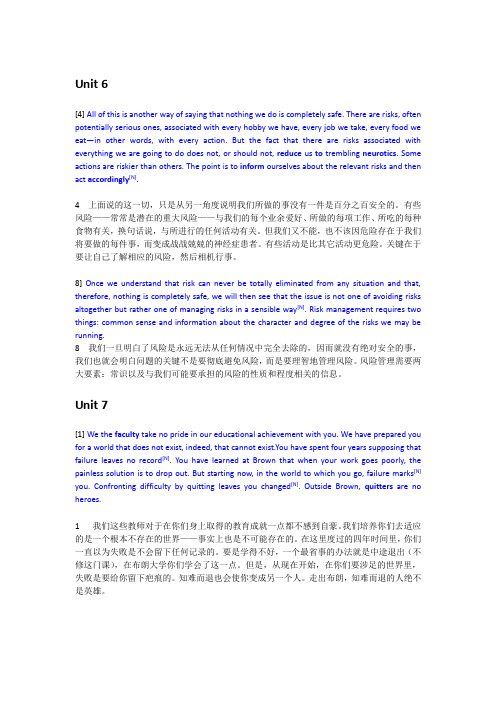
Unit 6[4] All of this is another way of saying that nothing we do is completely safe.There are risks, often potentially serious ones, associated with every hobby we have, every job we take, every food we eat—in other words, with every action.But the fact that there are risks associated with everything we are going to do does not, or should not, reduce us to trembling neurotics. Some actions are riskier than others.The point is to inform ourselves about the relevant risks and then act accordingly[N].4 上面说的这一切,只是从另一角度说明我们所做的事没有一件是百分之百安全的。
有些风险——常常是潜在的重大风险——与我们的每个业余爱好、所做的每项工作、所吃的每种食物有关,换句话说,与所进行的任何活动有关。
但我们又不能,也不该因危险存在于我们将要做的每件事,而变成战战兢兢的神经症患者。
有些活动是比其它活动更危险。
关键在于要让自己了解相应的风险,然后相机行事。
8] Once we understand that risk can never be totally eliminated from any situation and that, therefore, nothing is completely safe, we will then see that the issue is not one of avoiding risks altogether but rather one of managing risks in a sensible way[N].Risk management requires two things: common sense and information about the character and degree of the risks we may be running.8 我们一旦明白了风险是永远无法从任何情况中完全去除的,因而就没有绝对安全的事,我们也就会明白问题的关键不是要彻底避免风险,而是要理智地管理风险。
新编大学英语4课后答案(浙江大学)共24页
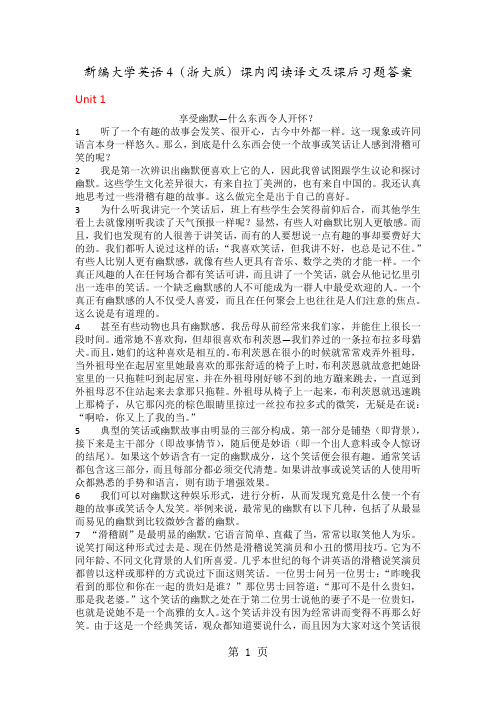
新编大学英语4(浙大版)课内阅读译文及课后习题答案Unit 1享受幽默—什么东西令人开怀?1 听了一个有趣的故事会发笑、很开心,古今中外都一样。
这一现象或许同语言本身一样悠久。
那么,到底是什么东西会使一个故事或笑话让人感到滑稽可笑的呢?2 我是第一次辨识出幽默便喜欢上它的人,因此我曾试图跟学生议论和探讨幽默。
这些学生文化差异很大,有来自拉丁美洲的,也有来自中国的。
我还认真地思考过一些滑稽有趣的故事。
这么做完全是出于自己的喜好。
3 为什么听我讲完一个笑话后,班上有些学生会笑得前仰后合,而其他学生看上去就像刚听我读了天气预报一样呢?显然,有些人对幽默比别人更敏感。
而且,我们也发现有的人很善于讲笑话,而有的人要想说一点有趣的事却要费好大的劲。
我们都听人说过这样的话:“我喜欢笑话,但我讲不好,也总是记不住。
”有些人比别人更有幽默感,就像有些人更具有音乐、数学之类的才能一样。
一个真正风趣的人在任何场合都有笑话可讲,而且讲了一个笑话,就会从他记忆里引出一连串的笑话。
一个缺乏幽默感的人不可能成为一群人中最受欢迎的人。
一个真正有幽默感的人不仅受人喜爱,而且在任何聚会上也往往是人们注意的焦点。
这么说是有道理的。
4 甚至有些动物也具有幽默感。
我岳母从前经常来我们家,并能住上很长一段时间。
通常她不喜欢狗,但却很喜欢布利茨恩—我们养过的一条拉布拉多母猎犬。
而且,她们的这种喜欢是相互的。
布利茨恩在很小的时候就常常戏弄外祖母,当外祖母坐在起居室里她最喜欢的那张舒适的椅子上时,布利茨恩就故意把她卧室里的一只拖鞋叼到起居室,并在外祖母刚好够不到的地方蹦来跳去,一直逗到外祖母忍不住站起来去拿那只拖鞋。
外祖母从椅子上一起来,布利茨恩就迅速跳上那椅子,从它那闪亮的棕色眼睛里掠过一丝拉布拉多式的微笑,无疑是在说:“啊哈,你又上了我的当。
”5 典型的笑话或幽默故事由明显的三部分构成。
第一部分是铺垫(即背景),接下来是主干部分(即故事情节),随后便是妙语(即一个出人意料或令人惊讶的结尾)。
(完整word版)新标准大学英语四综合教程Unit1-6课文及翻译
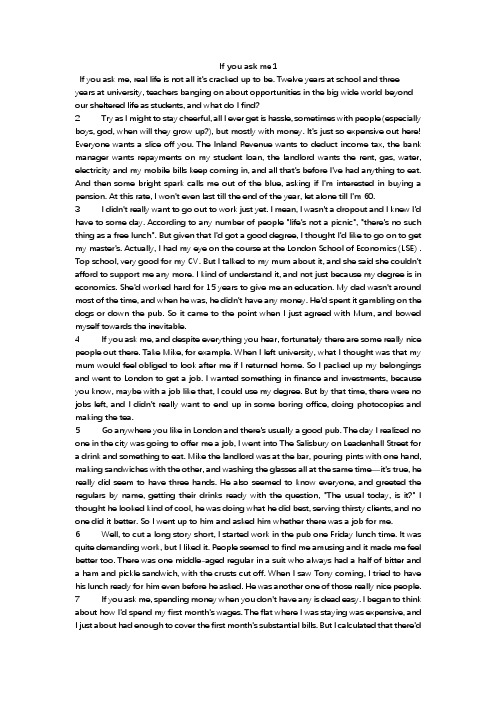
If you ask me1If you ask me, real life is not all it's cracked up to be. Twelve years at school and three years at university, teachers banging on about opportunities in the big wide world beyond our sheltered life as students, and what do I find?2 Try as I might to stay cheerful, all I ever get is hassle, sometimes with people (especially boys, god, when will they grow up?), but mostly with money. It's just so expensive out here! Everyone wants a slice off you. The Inland Revenue wants to deduct income tax, the bank manager wants repayments on my student loan, the landlord wants the rent, gas, water, electricity and my mobile bills keep coming in, and all that's before I've had anything to eat. And then some bright spark calls me out of the blue, asking if I'm interested in buying a pension. At this rate, I won't even last till the end of the year, let alone till I'm 60.3 I didn't really want to go out to work just yet. I mean, I wasn't a dropout and I knew I'd have to some day. According to any number of people "life's not a picnic", "there's no such thing as a free lunch". But given that I'd got a good degree, I thought I'd like to go on to get my master's. Actually, I had my eye on the course at the London School of Economics (LSE) . Top school, very good for my CV. But I talked to my mum about it, and she said she couldn't afford to support me any more. I kind of understand it, and not just because my degree is in economics. She'd worked hard for 15 years to give me an education. My dad wasn't around most of the time, and when he was, he didn't have any money. He'd spent it gambling on the dogs or down the pub. So it came to the point when I just agreed with Mum, and bowed myself towards the inevitable.4 If you ask me, and despite everything you hear, fortunately there are some really nice people out there. Take Mike, for example. When I left university, what I thought was that my mum would feel obliged to look after me if I returned home. So I packed up my belongings and went to London to get a job. I wanted something in finance and investments, because you know, maybe with a job like that, I could use my degree. But by that time, there were no jobs left, and I didn't really want to end up in some boring office, doing photocopies and making the tea.5 Go anywhere you like in London and there's usually a good pub. The day I realized no one in the city was going to offer me a job, I went into The Salisbury on Leadenhall Street for a drink and something to eat. Mike the landlord was at the bar, pouring pints with one hand, making sandwiches with the other, and washing the glasses all at the same time—it's true, he really did seem to have three hands. He also seemed to know everyone, and greeted the regulars by name, getting their drinks ready with the question, "The usual today, is it?" I thought he looked kind of cool, he was doing what he did best, serving thirsty clients, and no one did it better. So I went up to him and asked him whether there was a job for me.6 Well, to cut a long story short, I started work in the pub one Friday lunch time. It was quite demanding work, but I liked it. People seemed to find me amusing and it made me feel better too. There was one middle-aged regular in a suit who always had a half of bitter and a ham and pickle sandwich, with the crusts cut off. When I saw Tony coming, I tried to have his lunch ready for him even before he asked. He was another one of those really nice people.7 If you ask me, spending money when you don't have any is dead easy. I began to think about how I'd spend my first month's wages. The flat where I was staying was expensive, and I just about had enough to cover the first month's substantial bills. But I calculated that there'dbe just enough money over to treat myself to something. Why not get a CD or maybe a plant to cheer up the flat? I thought.8 It was my birthday on pay day. Apart from Mike and Tony, I didn't have any friends in London. Seeing that I didn't have a boyfriend either, you can understand why I began to feel sorry for myself. So I ordered myself some flowers, and asked them to be sent with a little card, saying "With all my love Anon." The highlight of my birthday would be the confused look on the florist's eyes when he delivered them.9 Later that week, Tony came in as usual and sat down at the bar. "What's wrong with you? Where's that smile gone today?" I talked to him about... well, about pretty well everything, money, the master's, my birthday, the lot. He sympathized with me.10 Tony got up from his stool, and went over to talk to some of the others. Remember: The Salisbury is right in the heart of the city, so all the customers were in banking or insurance or the stock market. Next day he turned up with cheques to the value of £20,000. "This is a loan for you to set up your business. The only collateral you have is my trust in you that one day, you'll pay us back—if you can. And if you can't, too bad, that's the finance business for you. But I think you will."11 I didn't say anything for fear that I was going to cry. What were the odds on anyone being so nice?12 And the flowers? I redirected them to my mum, and they arrived for her on my birthday. She deserved them, don't you think?13 If you ask me, looking back after all these years, you only need one or two breaks in your life to succeed. The fact that the rest is hard work doesn't matter, it's still worth it.14 After a year working at The Salisbury, I got a place at the LSE, did my master's and found a job in an investment bank. I in vested the £20,000, and sold out before the 2008 crash.I paid back Tony and the other investors, with ten per cent annual interest, and set up my own firm. It exceeded all my expectations and is still a thriving business.15 Tony wrote me a thank-you note. He'd been in a car accident, and couldn't walk. The money I paid back would allow him to adapt his house so he could move around it in his wheelchair. This is what he wrote:16 "Thirty-five years in banking, and I've never made a better investment than the loan to you. You've repaid the money with interest, and my trust in you and your honesty 100-fold. If you ask me, investing in people gives the best return you can ever hope for."17 If you ask me, he's right. What do you think?依我看依我看,现实生活并没有人们想象的那么好。
新编大学英语第四册第六单元重点词汇和句子
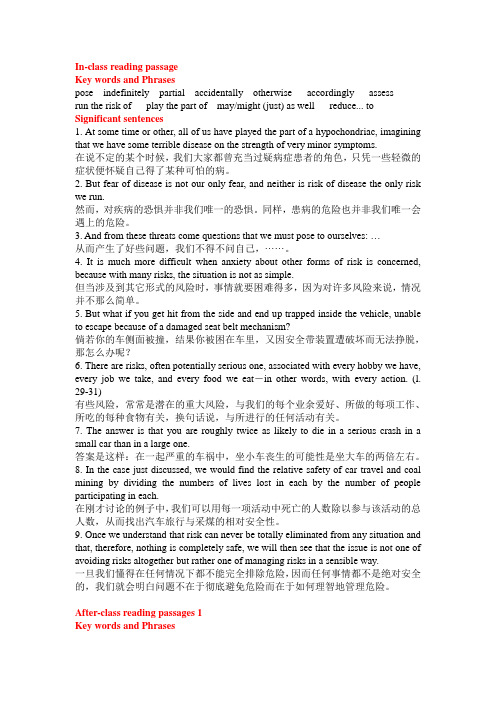
In-class reading passageKey words and Phrasespose indefinitely partial accidentally otherwise accordingly assessrun the risk of play the part of may/might (just) as well reduce... to Significant sentences1. At some time or other, all of us have played the part of a hypochondriac, imagining that we have some terrible disease on the strength of very minor symptoms.在说不定的某个时候,我们大家都曾充当过疑病症患者的角色,只凭一些轻微的症状便怀疑自己得了某种可怕的病。
2. But fear of disease is not our only fear, and neither is risk of disease the only risk we run.然而,对疾病的恐惧并非我们唯一的恐惧。
同样,患病的危险也并非我们唯一会遇上的危险。
3. And from these threats come questions that we must pose to ourselves: …从而产生了好些问题,我们不得不问自己,······。
4. It is much more difficult when anxiety about other forms of risk is concerned, because with many risks, the situation is not as simple.但当涉及到其它形式的风险时,事情就要困难得多,因为对许多风险来说,情况并不那么简单。
[英语学习]新编大学英语4课文翻译及课后习题答桉完整版
![[英语学习]新编大学英语4课文翻译及课后习题答桉完整版](https://img.taocdn.com/s3/m/2fc35140af1ffc4fff47ac22.png)
课内阅读参考译文及课后习题答案(Book 4)Unit 1享受幽默—什么东西令人开怀?1 听了一个有趣的故事会发笑、很开心,古今中外都一样。
这一现象或许同语言本身一样悠久。
那么,到底是什么东西会使一个故事或笑话让人感到滑稽可笑的呢?2 我是第一次辨识出幽默便喜欢上它的人,因此我曾试图跟学生议论和探讨幽默。
这些学生文化差异很大,有来自拉丁美洲的,也有来自中国的。
我还认真地思考过一些滑稽有趣的故事。
这么做完全是出于自己的喜好。
3 为什么听我讲完一个笑话后,班上有些学生会笑得前仰后合,而其他学生看上去就像刚听我读了天气预报一样呢?显然,有些人对幽默比别人更敏感。
而且,我们也发现有的人很善于讲笑话,而有的人要想说一点有趣的事却要费好大的劲。
我们都听人说过这样的话:“我喜欢笑话,但我讲不好,也总是记不住。
”有些人比别人更有幽默感,就像有些人更具有音乐、数学之类的才能一样。
一个真正风趣的人在任何场合都有笑话可讲,而且讲了一个笑话,就会从他记忆里引出一连串的笑话。
一个缺乏幽默感的人不可能成为一群人中最受欢迎的人。
一个真正有幽默感的人不仅受人喜爱,而且在任何聚会上也往往是人们注意的焦点。
这么说是有道理的。
4 甚至有些动物也具有幽默感。
我岳母从前经常来我们家,并能住上很长一段时间。
通常她不喜欢狗,但却很喜欢布利茨恩—我们养过的一条拉布拉多母猎犬。
而且,她们的这种喜欢是相互的。
布利茨恩在很小的时候就常常戏弄外祖母,当外祖母坐在起居室里她最喜欢的那张舒适的椅子上时,布利茨恩就故意把她卧室里的一只拖鞋叼到起居室,并在外祖母刚好够不到的地方蹦来跳去,一直逗到外祖母忍不住站起来去拿那只拖鞋。
外祖母从椅子上一起来,布利茨恩就迅速跳上那椅子,从它那闪亮的棕色眼睛里掠过一丝拉布拉多式的微笑,无疑是在说:“啊哈,你又上了我的当。
”5 典型的笑话或幽默故事由明显的三部分构成。
第一部分是铺垫(即背景),接下来是主干部分(即故事情节),随后便是妙语(即一个出人意料或令人惊讶的结尾)。
新编大学英语4课后翻译

Unit 1致命诱惑1英国离奇谋杀案小说的女皇,毫无疑问是阿加莎·克里斯蒂。
虽然作者本人在20多年前就去世了,但她创作的78部侦探小说还是非常畅销。
它们已经被译成了100多种语言,销量超过了20亿册。
2阿加莎的小说无论是在英国还是在其他国家,都如此受人喜爱并不难理解。
她的每本书都构思精巧。
她创造的人物一眼就能辨认出,情节的发展非常规范、准确、流畅。
但最重要的是,她所有的故事都给读者一个谜团。
3克里斯蒂的作品几乎都是以谋杀开场,迫使读者提出这样一个问题:“是谁干的?”,而最后总是水落石出。
读者的乐趣就在于根据故事里隐含的线索顺藤摸瓜,试图在作者揭开谜底之前找到正确答案。
这种模式吸引了人类最强烈的本能——好奇心——而人们对这种模式欢迎的程度没有任何减弱的迹象。
4很多离奇的案子都是由克里斯蒂笔下某个常常出场的侦探破解,例如那个非常自信的比利时人埃居尔·波洛探长,或者是那个显然没有恶意的小老太太马普尔小姐。
她同时也为她的故事创造了一个特有的背景,这一背景,如同她创作的一些人物一样为人们所熟知。
那是处于两次世界大战之间的英国,那儿的小村庄里社区关系紧密,生活安静,或者是城里的阔佬们在乡下的豪宅里度周末。
5这个世界有着严格的社会等级制度。
乡下宅子的主人,很可能是贵族成员,占据着社会的顶层,然后是那些职业阶层:医生、律师和商人。
处于底层的则是一般民众,在书中通常作为仆从、厨师和园丁出场。
当谋杀案发生时,需要调查的嫌疑人不在少数。
6阿加莎-克里斯蒂的世界不是一个完全真实的世界,这就是她的作品还没有过时的原因之一。
这是一个安定、循规蹈矩的世界,然后谋杀案打乱了人们的正常生活。
必须侦破案件,抓住杀人犯,恢复宁静的生活。
7在阿加莎·克里斯蒂一生的大部分时问里,英国的杀人犯都被处以死刑。
因此,她作品中的谋杀案一旦破获,找出了杀人犯,那么他或者她的末日也就到了。
不会有未了结的事情,读者于是就可以高枕无忧了。
新编大学英语4课文翻译和答案

课内阅读参考译文及课后习题答案(Book 4)Unit 1享受幽默—什么东西令人开怀1 听了一个有趣的故事会发笑、很开心,古今中外都一样。
这一现象或许同语言本身一样悠久。
那么,到底是什么东西会使一个故事或笑话让人感到滑稽可笑的呢2 我是第一次辨识出幽默便喜欢上它的人,因此我曾试图跟学生议论和探讨幽默。
这些学生文化差异很大,有来自拉丁美洲的,也有来自中国的。
我还认真地思考过一些滑稽有趣的故事。
这么做完全是出于自己的喜好。
3 为什么听我讲完一个笑话后,班上有些学生会笑得前仰后合,而其他学生看上去就像刚听我读了天气预报一样呢显然,有些人对幽默比别人更敏感。
而且,我们也发现有的人很善于讲笑话,而有的人要想说一点有趣的事却要费好大的劲。
我们都听人说过这样的话:“我喜欢笑话,但我讲不好,也总是记不住。
”有些人比别人更有幽默感,就像有些人更具有音乐、数学之类的才能一样。
一个真正风趣的人在任何场合都有笑话可讲,而且讲了一个笑话,就会从他记忆里引出一连串的笑话。
一个缺乏幽默感的人不可能成为一群人中最受欢迎的人。
一个真正有幽默感的人不仅受人喜爱,而且在任何聚会上也往往是人们注意的焦点。
这么说是有道理的。
4 甚至有些动物也具有幽默感。
我岳母从前经常来我们家,并能住上很长一段时间。
通常她不喜欢狗,但却很喜欢布利茨恩—我们养过的一条拉布拉多母猎犬。
而且,她们的这种喜欢是相互的。
布利茨恩在很小的时候就常常戏弄外祖母,当外祖母坐在起居室里她最喜欢的那张舒适的椅子上时,布利茨恩就故意把她卧室里的一只拖鞋叼到起居室,并在外祖母刚好够不到的地方蹦来跳去,一直逗到外祖母忍不住站起来去拿那只拖鞋。
外祖母从椅子上一起来,布利茨恩就迅速跳上那椅子,从它那闪亮的棕色眼睛里掠过一丝拉布拉多式的微笑,无疑是在说:“啊哈,你又上了我的当。
”5 典型的笑话或幽默故事由明显的三部分构成。
第一部分是铺垫(即背景),接下来是主干部分(即故事情节),随后便是妙语(即一个出人意料或令人惊讶的结尾)。
新编大学英语4课文翻译及课后习题答案完整版
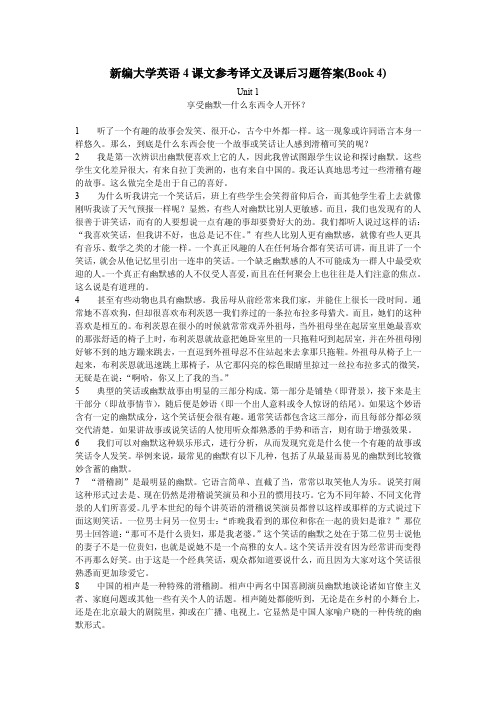
新编大学英语4课文参考译文及课后习题答案(Book 4)Unit 1享受幽默—什么东西令人开怀?1 听了一个有趣的故事会发笑、很开心,古今中外都一样。
这一现象或许同语言本身一样悠久。
那么,到底是什么东西会使一个故事或笑话让人感到滑稽可笑的呢?2 我是第一次辨识出幽默便喜欢上它的人,因此我曾试图跟学生议论和探讨幽默。
这些学生文化差异很大,有来自拉丁美洲的,也有来自中国的。
我还认真地思考过一些滑稽有趣的故事。
这么做完全是出于自己的喜好。
3 为什么听我讲完一个笑话后,班上有些学生会笑得前仰后合,而其他学生看上去就像刚听我读了天气预报一样呢?显然,有些人对幽默比别人更敏感。
而且,我们也发现有的人很善于讲笑话,而有的人要想说一点有趣的事却要费好大的劲。
我们都听人说过这样的话:“我喜欢笑话,但我讲不好,也总是记不住。
”有些人比别人更有幽默感,就像有些人更具有音乐、数学之类的才能一样。
一个真正风趣的人在任何场合都有笑话可讲,而且讲了一个笑话,就会从他记忆里引出一连串的笑话。
一个缺乏幽默感的人不可能成为一群人中最受欢迎的人。
一个真正有幽默感的人不仅受人喜爱,而且在任何聚会上也往往是人们注意的焦点。
这么说是有道理的。
4 甚至有些动物也具有幽默感。
我岳母从前经常来我们家,并能住上很长一段时间。
通常她不喜欢狗,但却很喜欢布利茨恩—我们养过的一条拉布拉多母猎犬。
而且,她们的这种喜欢是相互的。
布利茨恩在很小的时候就常常戏弄外祖母,当外祖母坐在起居室里她最喜欢的那张舒适的椅子上时,布利茨恩就故意把她卧室里的一只拖鞋叼到起居室,并在外祖母刚好够不到的地方蹦来跳去,一直逗到外祖母忍不住站起来去拿那只拖鞋。
外祖母从椅子上一起来,布利茨恩就迅速跳上那椅子,从它那闪亮的棕色眼睛里掠过一丝拉布拉多式的微笑,无疑是在说:“啊哈,你又上了我的当。
”5 典型的笑话或幽默故事由明显的三部分构成。
第一部分是铺垫(即背景),接下来是主干部分(即故事情节),随后便是妙语(即一个出人意料或令人惊讶的结尾)。
新编大学英语4课文翻译和答案
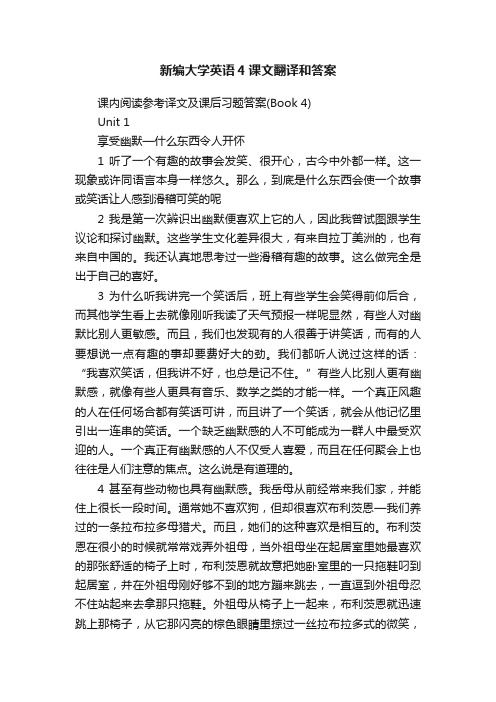
新编大学英语4课文翻译和答案课内阅读参考译文及课后习题答案(Book 4)Unit 1享受幽默—什么东西令人开怀1 听了一个有趣的故事会发笑、很开心,古今中外都一样。
这一现象或许同语言本身一样悠久。
那么,到底是什么东西会使一个故事或笑话让人感到滑稽可笑的呢2 我是第一次辨识出幽默便喜欢上它的人,因此我曾试图跟学生议论和探讨幽默。
这些学生文化差异很大,有来自拉丁美洲的,也有来自中国的。
我还认真地思考过一些滑稽有趣的故事。
这么做完全是出于自己的喜好。
3 为什么听我讲完一个笑话后,班上有些学生会笑得前仰后合,而其他学生看上去就像刚听我读了天气预报一样呢显然,有些人对幽默比别人更敏感。
而且,我们也发现有的人很善于讲笑话,而有的人要想说一点有趣的事却要费好大的劲。
我们都听人说过这样的话:“我喜欢笑话,但我讲不好,也总是记不住。
”有些人比别人更有幽默感,就像有些人更具有音乐、数学之类的才能一样。
一个真正风趣的人在任何场合都有笑话可讲,而且讲了一个笑话,就会从他记忆里引出一连串的笑话。
一个缺乏幽默感的人不可能成为一群人中最受欢迎的人。
一个真正有幽默感的人不仅受人喜爱,而且在任何聚会上也往往是人们注意的焦点。
这么说是有道理的。
4 甚至有些动物也具有幽默感。
我岳母从前经常来我们家,并能住上很长一段时间。
通常她不喜欢狗,但却很喜欢布利茨恩—我们养过的一条拉布拉多母猎犬。
而且,她们的这种喜欢是相互的。
布利茨恩在很小的时候就常常戏弄外祖母,当外祖母坐在起居室里她最喜欢的那张舒适的椅子上时,布利茨恩就故意把她卧室里的一只拖鞋叼到起居室,并在外祖母刚好够不到的地方蹦来跳去,一直逗到外祖母忍不住站起来去拿那只拖鞋。
外祖母从椅子上一起来,布利茨恩就迅速跳上那椅子,从它那闪亮的棕色眼睛里掠过一丝拉布拉多式的微笑,无疑是在说:“啊哈,你又上了我的当。
”5 典型的笑话或幽默故事由明显的三部分构成。
第一部分是铺垫(即背景),接下来是主干部分(即故事情节),随后便是妙语(即一个出人意料或令人惊讶的结尾)。
新编大学英语4课文翻译及课后习题答桉完整版

课内阅读参考译文及课后习题答案(Book 4)Unit 1享受幽默—什么东西令人开怀?1 听了一个有趣的故事会发笑、很开心,古今中外都一样。
这一现象或许同语言本身一样悠久。
那么,到底是什么东西会使一个故事或笑话让人感到滑稽可笑的呢?2 我是第一次辨识出幽默便喜欢上它的人,因此我曾试图跟学生议论和探讨幽默。
这些学生文化差异很大,有来自拉丁美洲的,也有来自中国的。
我还认真地思考过一些滑稽有趣的故事。
这么做完全是出于自己的喜好。
3 为什么听我讲完一个笑话后,班上有些学生会笑得前仰后合,而其他学生看上去就像刚听我读了天气预报一样呢?显然,有些人对幽默比别人更敏感。
而且,我们也发现有的人很善于讲笑话,而有的人要想说一点有趣的事却要费好大的劲。
我们都听人说过这样的话:“我喜欢笑话,但我讲不好,也总是记不住。
”有些人比别人更有幽默感,就像有些人更具有音乐、数学之类的才能一样。
一个真正风趣的人在任何场合都有笑话可讲,而且讲了一个笑话,就会从他记忆里引出一连串的笑话。
一个缺乏幽默感的人不可能成为一群人中最受欢迎的人。
一个真正有幽默感的人不仅受人喜爱,而且在任何聚会上也往往是人们注意的焦点。
这么说是有道理的。
4 甚至有些动物也具有幽默感。
我岳母从前经常来我们家,并能住上很长一段时间。
通常她不喜欢狗,但却很喜欢布利茨恩—我们养过的一条拉布拉多母猎犬。
而且,她们的这种喜欢是相互的。
布利茨恩在很小的时候就常常戏弄外祖母,当外祖母坐在起居室里她最喜欢的那张舒适的椅子上时,布利茨恩就故意把她卧室里的一只拖鞋叼到起居室,并在外祖母刚好够不到的地方蹦来跳去,一直逗到外祖母忍不住站起来去拿那只拖鞋。
外祖母从椅子上一起来,布利茨恩就迅速跳上那椅子,从它那闪亮的棕色眼睛里掠过一丝拉布拉多式的微笑,无疑是在说:“啊哈,你又上了我的当。
”5 典型的笑话或幽默故事由明显的三部分构成。
第一部分是铺垫(即背景),接下来是主干部分(即故事情节),随后便是妙语(即一个出人意料或令人惊讶的结尾)。
【精选】大学英语第四册课文翻译(含Section A与 Section B,目前最完整的翻译)
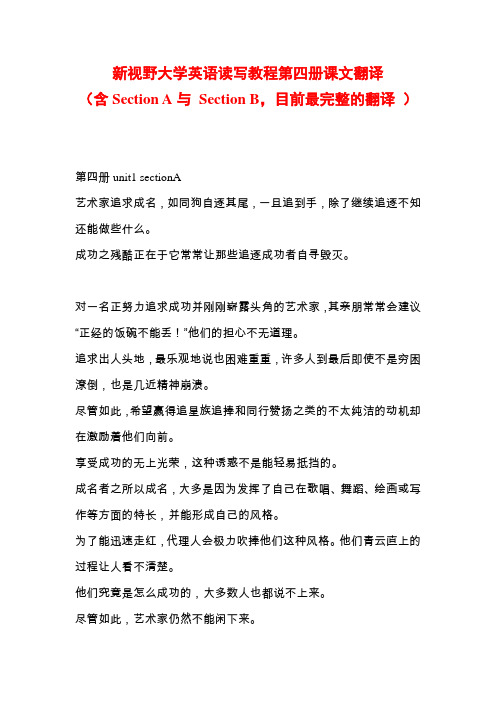
新视野大学英语读写教程第四册课文翻译(含Section A与Section B,目前最完整的翻译)第四册unit1 sectionA艺术家追求成名,如同狗自逐其尾,一旦追到手,除了继续追逐不知还能做些什么。
成功之残酷正在于它常常让那些追逐成功者自寻毁灭。
对一名正努力追求成功并刚刚崭露头角的艺术家,其亲朋常常会建议“正经的饭碗不能丢!”他们的担心不无道理。
追求出人头地,最乐观地说也困难重重,许多人到最后即使不是穷困潦倒,也是几近精神崩溃。
尽管如此,希望赢得追星族追捧和同行赞扬之类的不太纯洁的动机却在激励着他们向前。
享受成功的无上光荣,这种诱惑不是能轻易抵挡的。
成名者之所以成名,大多是因为发挥了自己在歌唱、舞蹈、绘画或写作等方面的特长,并能形成自己的风格。
为了能迅速走红,代理人会极力吹捧他们这种风格。
他们青云直上的过程让人看不清楚。
他们究竟是怎么成功的,大多数人也都说不上来。
尽管如此,艺术家仍然不能闲下来。
若表演者、画家或作家感到无聊,他们的作品就难以继续保持以前的吸引力,也就难以保持公众的注意力。
公众的热情消磨以后,就会去追捧下一个走红的人。
有些艺术家为了不落伍,会对他们的写作、跳舞或唱歌的风格稍加变动,但这将冒极大的失宠的危险。
公众对于他们藉以成名的艺术风格以外的任何形式都将不屑一顾。
知名作家的文风一眼就能看出来,如田纳西?威廉斯的戏剧、欧内斯特?海明威的情节安排、罗伯特?弗罗斯特或T.S.艾略特的诗歌等。
同样,像莫奈、雷诺阿、达利这样的画家,希区柯克、费里尼、斯皮尔伯格、陈凯歌或张艺谋这样的电影制作人也是如此。
他们鲜明独特的艺术风格标志着与别人不同的艺术形式上的重大变革,这让他们名利双收,但也让他们付出了代价,那就是失去了用其他风格或形式表现自我的自由。
名气这盏聚光灯可比热带丛林还要炙热。
骗局很快会被揭穿,过多的关注带来的压力会让大多数人难以承受。
它让你失去自我。
你必须是公众认可的那个你,而不是真实的你或是可能的你。
新编大学英语4课文翻译(包括课后文章翻译)和答案
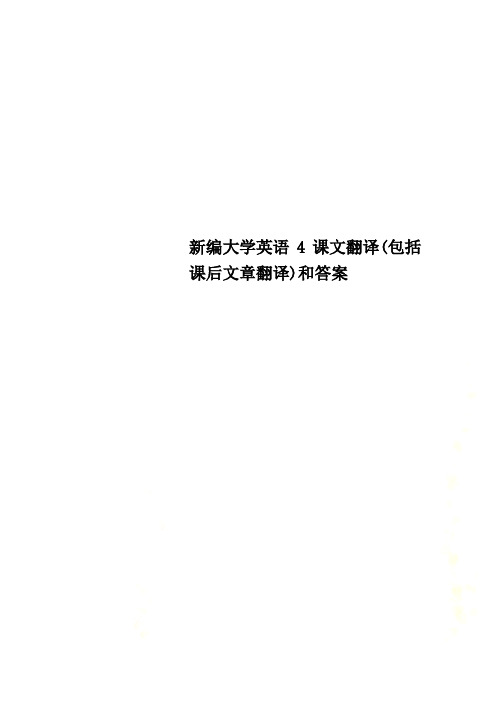
新编大学英语4课文翻译(包括课后文章翻译)和答案Reading comprehension1略2 BDCAC AADBBVocabulary1. 1) A. entertaining B. entertainment C. entertainedD. entertainer2) A. recognizable B. recognized C. recognition3) A. tempting B. temptation C. tempt4) A. reasoned B. reasoning C. reasonable D. reason5) A. analyzed B. analytical C. analyst D. analysis6) A. valuable B. valuation C. valued/values D. values7) A. humorist B. humor C. humorous D. humorless8) A. understandable B. understanding C. understand D. misunderstood2. 1) a sense of responsibility 2) a sense of safety/security3) a sense of inferiority4) a sense of superiority 5) a sense of rhythm 6) a sense of justice7) a sense of shame 8) a sense of helplessness 9) a sense of direction10) a sense of urgency3. 1) Lively behavior is normal2) Fast cars appeal to3) diverse arguments4) I asked my boss for clarification5) sensitive to light6) Mutual encouragement7) made fun of him8) persists in his opinion/viewpoint9) to be the focus/center of attention10) we buy our tickets in advance4. 1)certain/sure 2) involved 3) end 4) behavior 5) disciplining6) agreed7) individually 8) first 9) response 10) question 11) attempt 12) voice13) directly 14) followed 15) troubleUnit 2便笺的力量Reading comprehension1略2 FFTFTFTFTTFTFTVocabulary1. Creating Compound WordsSTEP ONE:Column A Column B The compound words createdthrough day throughoutup man upbeat, upliftdraw eared drawbackteen ready teenagehand conscious handout, handwrittenbirth back birthday, birthstonechair distance chairmanrag beat rag-earedever lift ever-readyover age overdue, overagelong due long-distance, long-earedself stone self-consciousmile out mileage, milestonetype wishing typewriter, typewrittenwell writer/written well-wishing, well-writtenSTEP TWO:1) long-distance 2) upbeat 3) ever-ready 4) overdue 5) typewriter6) milestone 7) handwritten 8) uplifted 9) self-conscious10) rag-eared11) birthday 12) throughout 13) drawbacks 14) chairman 15) teenage2. 1) A. intrigued v. interestB. intrigue n. the act or practice of secretly planning to harm someone or make them lose their position of power2) A. straining v. try very hard to do something using all your physical or mental strengthB. strain n. a force that stretches, pulls or puts pressure on something3) A. savor n. taste; flavorB. savored v. enjoy the taste or flavor of; enjoy as much as you can4) A. treasure v. treat something as being very special, important,or valuableB. treasure n. a store of gold, silver, jewels, etc.5) A. credited v. consider … as having achieved something or be ingthe reason for itB. credit n. trust; faith6) A. boost n. an encouraging act of cheering somebody upB. boost v. make someone feel more confident and less worried7) A. note n. a short, usually informal, letterB. noted v. notice or pay careful attention to something8) A. signed v. write your signature on a letter or document to showthat you wrote it, agreed with itB. sign n. gesture used to express one’s meaning, idea, etc.9) A. totaled v. come to a certain amountB. total n. the whole amount10) A. stuffed v. fill something with a substanceB. stuff n. substance or material11) A. count n. the number that is reached when something is being countedB. count v. be important12) A. last v. manage to remain in the same situationB. last n. the remaining part of something13) A. complimented v. express praise or admiration of somebodyB. compliment n. an expression of praise, admiration, approval, etc.14) A. flood n. a large number or amountB. flooding v. arrive in large numbers15) A. contact n. communication with a person, organization, country, etc.B. contact v. reach (someone) by message, telephone, etc.3. 1) thrives 2) strategy 3) annual 4) deserve 5) spontaneous 6) sincere 7) investments 8) enterprise 9) follow up 10) characterized11) lingered 12) acknowledged4. column: 1) D 2) A 3) B 4) Ctough: 1) D 2) B 3) E 4) F 5) C 6) A5.1) A. complementary B. complimentary C. complimentarycomplimentary: 1) expressing admiration, praise, etc.2) given free of chargecomplementary: making something complete or perfect; supplying what islacking or needed for completion2) A. stationery B. stationary C. stationarystationary: not moving, or not changingstationery: writing materials (e.g. paper, envelopes, etc.)3) A. typist B. typewriter C. typisttypewriter: a machine with a keyboard that you use for typing words directly onto a sheet of papertypist: a person who types, especially one employed to do so4) A. vulgar B. vague C. vaguevague: 1) not clearly expressed, known, described or decided2) not clear in shape; not clearly seenvulgar: not having or showing good taste or good manners; not educated 5) A. pad B. pat C. padpad: 1) several sheets of paper fastened together, used for writing, drawing, etc.2) a piece of soft thick cloth or rubber which is used to protect a partof the body, give shape to something or clean something6) A. own B. owed C. owes D. ownedowe: 1) have to pay, for something already done or given2) feel gratefulown: 1) a. belonging to oneself and to no one else2) v. possess (something), especially by lawful right6.1) searched 2) clever 3) solution 4) wasted 5) tolerate 6) hidden 7) dumb 8) subject 9) noise 10) extra 11) purchased 12) replaced 13) appreciation 14) hurried 15) warrant 16) strangeUnit 3从文化角度看性别角色1 Understanding the Organization of the Text(1) Introduction (para 1)It has been proven repeatedly that the various types of behavior, emotions, andinterests that constitute being masculine and feminine are patternedby both heredityand culture.(2) There is a cultural bias in education that favors boys over girls. (para. 2-4)Supporting evidenceA. Teachers called on males in class far more than on female students. (para 2)i) Its consequence: This has a tremendous impact on the learning process.ii) The reason for this: Active classroom participants develop more positive attitudesand go on to higher achievement.iii) Two examples:a. In many of the former all-women’s colleges, the boys were taking over the class-room discussions and active participation by women students had diminished noticeably.b. A similar subordination of female to male students has also been observed in law and medical school classrooms in recent years.B. Teachers assigned boys and girls different tasks according to stereotyped gender roles. (para. 3)i) Its consequence: This prevented girls from participating as actively as boys in class.ii) An example: A teacher had the little boys perform the scientific experiment while the girls were given the task of putting the materials away.C. Gender-biased education is also reflected in the typical American teacher’ assumption. (para 4)i) The assumption: Boys will do better in the hard, masculine subjects of math and science while girls are expected to have better verbal and reading skills.ii) Three examples:a. American boys do develop reading problems, while girls, who are superior to boys in math up to the age of nine, fall behind from then on.b. In Germany, all studies are considered masculine and it is girls who develop reading problems.c. In Japan, where early education appears to be nonsexist, both girls and boys do equally well in reading.(3) The educational bias begins at home. (para 5)A. Supporting evidence:i) Boy preschoolers were permitted to go away from home in a much wider area than girl preschoolers.ii) Boys were encouraged to develop intellectual curiosity and physical skills, while girls are filled with fears of the world outside the home and with the desire to be approved of for their goodness and obedience to rules.B. The consequence when these lessons carry over from the home to the classroom: Girls are generally observed to be more dependent on the teacher, more concerned with the form and neatness of their work than its content, and more anxious about being right in their answers than in being intellectually independent, analytical, or original.C. Conclusion: Through the educational process that occupies most of the child’s waking hours, society reinforces its established values and turns out each sex in its traditional and expected mold.2 CBDBCDVocabulary1. 1) genetic 2) assign 3) noticeably 4) approved5) Bias6) deprived 7) constituted 8) participation 9) unintentional 10) postgraduate2. conscious –unconscious positive –negativeencourage –discourage superior –inferiordirectly – indirectly biased –fairsexist – nonsexist limited –unlimiteddependent – independent appropriately –inappropriately3. 1) C 2) D 3) A 4) E 5) B 6) C 7) F 8) B4. 1) turn out 2) carry over 3) calling on 4) put away 5) fallen behind 6) take over男生是老师的宠儿Unit 4关于创造力的培养——鼓励孩子思考Reading Comprehension1. 1) Introduction(para 1)It is introduced in the article how teachers and parents can encouragecreativity in children.2) An important strategy for parents and teachers to follow (para.2-3)A. The strategy:To encourage children to spend time thinking and developing new ideas.B. The significance for adopting the strategy:If children can be taught to think creatively, they will be betterable tofunction in tomorrow’s society.3) The definition of creativity (para. 4-5)A. Who successful students and adults are:Those who can find a number of ways to approach problems.B. What creative people can do:They can use what they have to produce original ideas that are good forsomething.4) A big problem in school (para. 6)The problem: Children can obtain and give back information, but can’t figureout ways to apply what they know in new situations.5) A new approach to teaching (para 7)A. The approach: Combining the basics with the activities where students mustuse their imaginations.B. How to do so: By asking questions and meanwhile praising their ideas andnew thoughts.C. How to facilitate the process: To create an atmosphere in which there is norisk in being creative-- a place where wild ideas are honored and valued,never scorned or dismissed.6) Things parents can do at home to encourage creativity (para. 8-10)A. To involve children in decision making.B. To help children to understand the consequences of various decisions.C. To encourage them to talk out loud about things they are doing. The reasonfor doing so: Talking out loud improves language skills and thinking skills.D. To show a sense of humor. The reason for doing so: Children can seecreativity in its purest form.E. To give children choices from their earliest age.Examples:a. When they are very young, let them choose between two food items forlunch.b. B. When they grow older, let them decide how to use their time or spendtheir money2 understanding specific informationTFFTTFFTVocabulary1. 1) confused, confusion 2) intelligence, intelligent 3) humorous, humor4) strategy, strategic 5) motivated, motivation 6) combination, combined7) creation, creative 8) pursuit, pursuing 9) multiplication, multiply10) employ, employment2. 1) perfected 2) approaching 3) value 4) functions 5) approach6) perfect 7) honor 8) function 9) honor 10) value 3. 1) dismiss 2) consequences 3) promoting 4) applies 5) vital6) scorned 7) conventional 8) original4. 1) consciously 2) innovative 3) unconsciously 4) determines5) Imagination6) aware 7) control 8) created 9) extension 10) technique11) vulnerable 12) unfolding 13) joyful 14) gain 15) Applyunit 5Understanding the organization of the text1) Introduction (para. 1)Athletes are chosen to be role models, and they can choose only to be good orbad ones.2) Athletes should be role models. (para. 2-5)The author’s arguments:A. Athletes should not refuse the responsibility of being a role model whileaccepting all the glory and the money that comes with being a famous athlete.(para. 2)B. I try to be a positive role model, but that doesn’t mean I am perfect. (para. 3)C. Qualities of a positive role model: (para. 4)a. He influences people’s lives in a positive way.b. He gives of himself in time or money to help those who look up to him.c. He displays the values like honesty and determination.D. Athletes cannot take the place of parents, but can help reinforce what parentstry to teach their children. (para. 5)3) People sometimes expect so muc h that some athletes don’t want to be rolemodes. (para. 6-7)A. Sometimes people put athletes on a pedestal.Example: I have had parents in Utah put my picture on the wall beside JesusChrist. (para. 6)B. Constantly being watched by the public can be hard to tolerate at times. Example: 1: Negative publicity Michael Jordan received about gambling.2. Ever since I played on the Dream Team, I can’t go anywherewithout being the center of attention and I can’t even buy amotorcycle I really want. (para. 7)4) Conclusion (para 8-9)The good things about being a role model outweigh the bad.A. It’s a great feeling to think you are part of the reason that a id decided to tryto be good.B. But parents should remind their kids that there are no perfect human beings.C. Charles Barkley is a good role model.2、F T F T F F F F T F T FVocabulary2. 1) is bound to 2) follow their lead 3) goes too far/is going too far4) take the place of 5) dropped out 6) have a fit 7) measure up to8) look up to 9) Let’s face it 10) you name it3. 1) outgrown 2) outdo 3) outwitted 4) outweigh 5) outlived Unit 6风险与你Vocabulary Practice1.1) sensiblesensible: having or showing good sense; reasonablesensitive: easily hurt, upset, or offended by things that people say 2) relativerelevant: directly connected with the subject or problem being discussed or consideredrelative: considered in relation or proportion to somebody/something else; comparative3) mechanismmachine: 机器mechanism: a structure of working parts functioning together to produce an effect4) requiresrequire: need somethingrequest: ask for something politely or formally5) eliminatereduce: make something smaller in size, number, degree, price, etc. eliminate: completely get rid of something that is unnecessary or unwanted6) crashcrash: a breaking to pieces especially by or as if by collision collision: an accident in which two or more people or vehicles hit each other while moving in different directions2.1) character 2) end up 3) Rarely 4) casual 5) risky 6) all manner of 7) inform 8) sensible 9) definitively3.1) On the strength of 2) all manner of 3) feed on 4) reduce…to 5) end up6) associated with 7) focus on 8) turned to 9) participate in 10) involved in健康威胁1. belief –doubt deep- shallow learn- unlearn shame- pride inadequate-adequatesuccess- failure boring- interesting dependent-independent mediocre-excellent uselessusefulwell-informed ---- ill-informed smart- dull painful-painless imaginativeunimaginative2. 1) deprived of 2) for the sake of 3) get away with 4) dropped out 5) by no means6) got down to 7) distinguish…from 8) look back on 9) gone through10) after all 11) be rid of 12) on my own3.choice secure hear who keep while now This pressure expecting tests within had catch marks patents obtain/get teachers relax shape1. C E B D A F2. relearn再学习 regain收回,重新获得 redo 重做,再做 rewrite重写,改写rearrange重新整理 reclaim要求归还,收回 remodel重新塑造,改变replace取代rephrase重新措辞rejoin 再结合,在加入reform 改革readjust 重新调整reunited(使)再结合 rebroadcast 转播,重播 reread 再读 review 复习3. B A D A D C A A A B社会时间:文化的脉搏1. 1) observation 2) available 3) discoveries 4) acceptance 5) experimentation6) inventions 7) evolution 8) adaptable 9) innovative 10) objectivity2. 1) out of the ordinary 2) preceded 3) To be exact 4) Contradict(ed) 5) ProsperityCOLUMN A COLUMN Binvention inventavailable AvailInnovation InnovateAdaptable AdaptDiscovery DiscoverAcceptance AcceptEvolution EvolveObjectivity ObjectiveObservation ObserveExperimentation ExperimentProsperity Prosperdisastrous disaster6) Gave birth to 7) Catch our breath 8) had in mind 9) proposed 10) converted 11) disastrous 12) negative3. 1) She had hardly sat down2) Especially if/ when you want to reserve a seat3) is not necessarily the most useful4) What sort/kind of person do you have in mind5) There’s a limit on the time6) Spend part of his childhood7) three times as many girls as boys8) as do most of the people who live in this village9) but on the other hand it would be sad to lose the family atmosphere10) Depite/ In spite of international pressure。
新编大学英语综合教程4第六单元课文总结
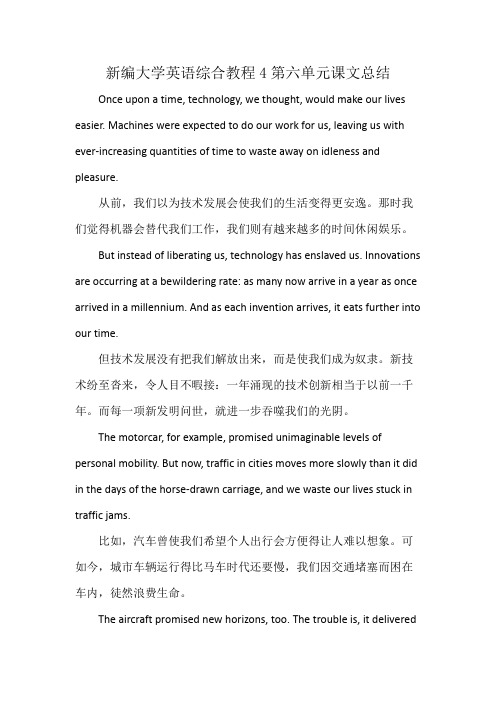
新编大学英语综合教程4第六单元课文总结Once upon a time, technology, we thought, would make our lives easier. Machines were expected to do our work for us, leaving us with ever-increasing quantities of time to waste away on idleness and pleasure.从前,我们以为技术发展会使我们的生活变得更安逸。
那时我们觉得机器会替代我们工作,我们则有越来越多的时间休闲娱乐。
But instead of liberating us, technology has enslaved us. Innovations are occurring at a bewildering rate: as many now arrive in a year as once arrived in a millennium. And as each invention arrives, it eats further into our time.但技术发展没有把我们解放出来,而是使我们成为奴隶。
新技术纷至沓来,令人目不暇接:一年涌现的技术创新相当于以前一千年。
而每一项新发明问世,就进一步吞噬我们的光阴。
The motorcar, for example, promised unimaginable levels of personal mobility. But now, traffic in cities moves more slowly than it did in the days of the horse-drawn carriage, and we waste our lives stuck in traffic jams.比如,汽车曾使我们希望个人出行会方便得让人难以想象。
新编大学英语4课后翻译

新编大学英语4课后翻译Unit one1、Lively behavior is norm al for a four-year-old child. (活泼的举止是正常的)2、Fast cars appeal to John, but he can’t afford one. (速度快的车对……有吸引力)3、Dave required a lot of tim e to study the diverse argum ents. (多种多样的论据)4、I asked m y boss for clarification, and she explained the project to m e again. (我要求我的上司为我解释清楚)5、 Photographic film is very sensitive to light. (对光很敏感)6、Mutual encouragem ent can be a great help, especially in early days. (相互鼓励)7、Jimm y cried when people m ade fun of him. (拿他开玩笑)8、John won’t give up. He persists in his opinion. (坚持他的观点)9、Ted always wants to be the focus of attention. (成为注意的焦点)10、Is it cheap if we buy our tickets in advance. (我们提前买票)Unit five1、Don’t lie to him. He is bound to find about it.2、The m ine-workers went on strike, and the railroad unions threatened to follow their lead.3、It is all very well to be frugal (节约), but he goes too far.4、He told us that he would take the place of his father in the company for a while.5、I haven’t seen that student of m ine for som e tim e; do you think she’s dropped out.6、 Your m other would have a fit if she knew you were here.7、These products m easure up to the national standards.8、 When we were young, we were taught to look up to the police.9、Let’s face it, we won’t win whatever we do.10、My father can m ake anything: chairs, tables, cupboards--- you nam e it.Unit six1、 On the strength of those grades, he won the scholarship to Yale University. (基于)2、The m arket has all m anner of interesting things for sale. (各种各样)3、Faith does not feed on thin air but on facts. (由……滋润)4、The teacher told the girl to reduce an equation to its sim plest form.(简化方程式)5、Keep on doing that and you will end up in serious trouble.(最后以某某结尾)6、The environm ent problems are often associated with nuclear waste.(和……有关系)7、Today we are going to focus on the question of hom eless people.(把重点放在)8、For assistance, they turned to one of the city’s m ost innovate m useum.(向……求助)9、Everyone in the class is expected to participate actively in these discussions.(积极参加)10、The Southern weekend identified at least two village officials said to be involved in the trade.(卷入)Unit seven1、No one can function properly if he or she deprived of adequate sleep.2、John and Mary stayed together only for the sake of the children.3、If I thought I could get away with it I wouldn’t pay any taxes at all.4、Bill dropped out of high school at the age of 16 when his parents died in a car crash.5、I should warn you, Miss Gray. This is by no m eans the first time you have been late.6、Don’t you think it’s tim e we get down to business?7、The light is so dim that I cannot distinguish one speaker from another.8、I like to look back on m y high school days, which were am ong the happiest in m y life.9、We couldn’t tell Robert had gone through a very difficult time.10、She should not be working so hard? She is 70, after all.11、I did not enjoy m arketing those papers and I was glad to be rid of them.12、I would rather not going to t he dance on m y own; I do wish you’d com e with m e.今年课后的翻译较少,大家觉得有用就看一下吧,没用就忽略~~考试顺利!!!第六单元最后的翻译1) Prom ising new technologies can power our hom es, factories and cars with cleaner, m ore efficient energy – cutting em issions while strengthening our econom y.2) Indeed, unless we reach across borders and face threats to the environm ent together, the earth may be confronted with an ecological crisis, with half of all species gone, and our grand children enduring deadly floods, droughts and disease brought on by global warm ing.3) Our planet is a biosphere, which demands that nations work in global partnership to solve com plex environm ental problems such as the long-range transport of air pollutants and hazardous waste disposal.4) Risks are an unavoidable part of life. They stem from rare events such as earthquakes and fires or from slowly accum ulating effects of exposure to hazardous conditions and probably cause loss of property, even loss of life.5) Only 100 years ago m an lived in harm ony with nature. Today this harm onious relationship is threatened by m an’s lack of foresight and planning, and by his carelessness and greed, for m an is slowly poisoning his environm ent.。
大学英语第四册课文翻译

我们要对自己的行为负责,我们也要为相互的行为负责,否则就会毁掉父亲建立起来的好名声。
我们的好名声曾经是,现在仍是把我们家紧紧联系在一起的纽带。
我不愿意辜负父亲的好名声,这激励我成为了家里第一个上大学的人。
我靠在一家四星级酒店当行李工挣钱读完了大学。最终,好名声促使我在华盛顿特区开办了我个人的公共关系公司。
中产阶级当然这样认为。劳动阶层反倒更有可能为这样一个反抗权势的角色拍手喝彩:他以顽皮的小拐杖使绊子,或用皮靴后跟对准权势者肥大的臀部踢一下。
尽管如此,卓别林的滑稽乞丐形象并不那么像英国人,甚至也不像劳动阶级的人。
英国流浪者并不留小胡子,也不穿肥大的裤子或燕尾服:欧洲的领导人和意大利的侍者才那样穿戴。
艺人,就像政客一样,必须常常说些违心或连自己都不完全相信的话来取悦听众。
一滴名气之水有可能玷污人的心灵这一整口井,因此一个艺术家若能保持真我,会格外让人惊叹。
你可能答不上来哪些人没有妥协,却仍然在这场名利的游戏中获胜。
一个例子就是爱尔兰著名作家奥斯卡·王尔德,他在社交行为和性行为方面以我行我素而闻名于世。虽然他的行为遭到公众的反对,却依然故我,他也因此付出了惨痛的代价。
公众对于他们藉以成名的艺术风格以外的任何形式都将不屑一顾。
知名作家的文风一眼就能看出来,如田纳西·威廉斯的戏剧、欧内斯特·海明威的情节安排、罗伯特·弗罗斯特或 T.S.艾略特的诗歌等。
同样,像莫奈、雷诺阿、达利这样的画家,希区柯克、费里尼、斯皮尔伯格、陈凯歌或张艺谋这样的电影制作人也是如此。
他也深切地渴望被爱,同时也害怕遭到背叛。
这两者很难结合在一起,有时这种冲突导致了灾难,就像他早期的几次婚姻那样。
然而即使是这种以沉重代价换来的自知之明也在他的喜剧创作中得到了表现。
新编大学英语4文章翻译
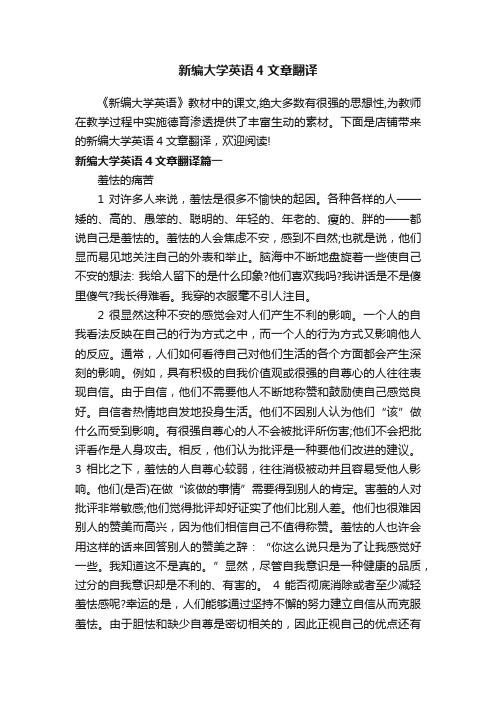
新编大学英语4文章翻译《新编大学英语》教材中的课文,绝大多数有很强的思想性,为教师在教学过程中实施德育渗透提供了丰富生动的素材。
下面是店铺带来的新编大学英语4文章翻译,欢迎阅读!新编大学英语4文章翻译篇一羞怯的痛苦1 对许多人来说,羞怯是很多不愉快的起因。
各种各样的人——矮的、高的、愚笨的、聪明的、年轻的、年老的、瘦的、胖的——都说自己是羞怯的。
羞怯的人会焦虑不安,感到不自然;也就是说,他们显而易见地关注自己的外表和举止。
脑海中不断地盘旋着一些使自己不安的想法: 我给人留下的是什么印象?他们喜欢我吗?我讲话是不是傻里傻气?我长得难看。
我穿的衣服毫不引人注目。
2 很显然这种不安的感觉会对人们产生不利的影响。
一个人的自我看法反映在自己的行为方式之中,而一个人的行为方式又影响他人的反应。
通常,人们如何看待自己对他们生活的各个方面都会产生深刻的影响。
例如,具有积极的自我价值观或很强的自尊心的人往往表现自信。
由于自信,他们不需要他人不断地称赞和鼓励使自己感觉良好。
自信者热情地自发地投身生活。
他们不因别人认为他们“该”做什么而受到影响。
有很强自尊心的人不会被批评所伤害;他们不会把批评看作是人身攻击。
相反,他们认为批评是一种要他们改进的建议。
3 相比之下,羞怯的人自尊心较弱,往往消极被动并且容易受他人影响。
他们(是否)在做“该做的事情”需要得到别人的肯定。
害羞的人对批评非常敏感;他们觉得批评却好证实了他们比别人差。
他们也很难因别人的赞美而高兴,因为他们相信自己不值得称赞。
羞怯的人也许会用这样的话来回答别人的赞美之辞:“你这么说只是为了让我感觉好一些。
我知道这不是真的。
”显然,尽管自我意识是一种健康的品质,过分的自我意识却是不利的、有害的。
4 能否彻底消除或者至少减轻羞怯感呢?幸运的是,人们能够通过坚持不懈的努力建立自信从而克服羞怯。
由于胆怯和缺少自尊是密切相关的,因此正视自己的优点还有弱点非常重要。
例如,大多数人希望每门功课都得A。
- 1、下载文档前请自行甄别文档内容的完整性,平台不提供额外的编辑、内容补充、找答案等附加服务。
- 2、"仅部分预览"的文档,不可在线预览部分如存在完整性等问题,可反馈申请退款(可完整预览的文档不适用该条件!)。
- 3、如文档侵犯您的权益,请联系客服反馈,我们会尽快为您处理(人工客服工作时间:9:00-18:30)。
课内阅读参考译文
风险与你
在说不定地某个时候,我们大家都曾充当过疑病症患者地角色,只凭一些轻微地症状便怀疑自己得了某种可怕地病.有地人只要一听说一种新地疾病,就会去检查,看自己是否可能患了这种病.然而,对疾病地恐惧并非我们唯一地恐惧.同样,患病地危险也并非我
们唯一会遇上地危险.现代生活中充满了各种各样地威胁,诸如对我们生命地威胁,对我们平和心境地威胁,对我们家人地威胁,对我们未来地威胁.从而产生了好些问题,我们不得不问自己:我买地食品安全吗?给孩子们地玩具会伤害他们吗?我们家地人是不是不
该吃熏肉?我度假时会不会遭抢劫?我们地疑虑就无休止地增加.
对生活中风险地担忧与疑病症有相似之处;二者地恐惧或忧虑皆起因于信息不全面.
但二者之间也存在一个明显地差别.疑病症患者通常可以求助于医生,以便澄清疑虑——要么你得了你所怀疑地疾病,要么你没得.但当涉及到其他形式地风险时,事情就要困难得多,因为对许多风险来说,情况并不那么简单.
风险几乎总是一个可能性地问题而无确定性可言.你也许会问:“我该不该系安全带?”
如果你坐地车要与其他车正面相撞,那当然该系安全带.倘若你地车侧面被撞,因安全带装置遭破坏而被困在车里,无法挣脱,那怎么办呢?这是否意味着你该再花些钱在车内安一个保险气袋呢?同样,在正面相撞地情况下,保险气袋完全可以救你一命.但是,万一
正当你在高速公路上开车时,保险气袋突然意外充气膨胀,从而导致了本来绝不会发生地事故,那又该如何是好?
上面说地这一切,只是从另一角度说明我们所做地事没有一件是百分之百安全地.有
些风险——常常是潜在地重大风险——与我们地每个业余爱好、所做地每项工作、所吃地每种食物有关,换句话说,与所进行地任何活动有关.但我们又不能,也不该因危险存在于我们将要做地每件事,而变成战战兢兢地神经症患者.有些活动是比其他活动更危险.
关键在于要让自己了解相应地风险,然后相机行事.
例如,两车相撞时,大车总地说来要比小车安全些.可究竟能安全多少呢?答案是这
样:在一起严重地车祸中坐小车丧生地可能性是坐大车地两倍左右.然而,大车通常比小车贵(并且消耗更多地汽油,由此给环境带来了更大地风险!).那么我们该怎样确定什么
时候值得为降低风险增加花费呢?例如,避免风险最保险地做法也许是去买一辆坦克或装甲车,从而把撞车时死亡或受伤地风险降到最小.然而,即便你买得起,这笔额外地费用以及忍受坦克或装甲车所带来地不便是否值得呢?
在我们尚不知所涉及地风险程度之前,我们还无法回答这些问题.那么,我们该如何
去衡量风险程度呢?有些人似乎认为答案只不过是一个简单地数字.例如,我们知道每年
大约有人死于车祸.相比之下,每年只有大约人死于矿山事故和灾难.这难道
就意味着乘坐汽车要比采矿危险得多吗?未必.事实是,在美国每年大约有两亿人经常性
地以车代步;而大概只有万人从事采矿作业.我们评估一种风险时,所需要地有关数字
是一个比率或分数.该分数地分子告诉我们在某个特定时期由于从事某种特定活动而丧生或受伤地人数;其分母告诉我们在这一时期从事这种活动地总人数.这样,所有地风险程度都是由比率或分数表示,其大小介于(无风险)到(完全风险)之间.
通过把所有风险都简化为这种比率或分数,我们便可以开始比较不同种类地风险,如比较采矿与乘坐汽车.这个比率越大,也就是说它越接近,那么有关活动地风险就越大.
在刚才讨论地例子中,我们可以用每一活动中死亡地人数除以参与该活动地总人数,从而找出汽车旅行与采煤地相对安全性.此处,我们可以很清楚地看到,乘坐汽车旅行地风险是每一万人中大约有一人丧生;而就采矿而言,其危险程度是每一万矿工中大约有四人死亡.所以,尽管在车祸中丧生地人远比采矿要多,其实后者地风险是前者地四倍.这些比
率使我们能够对毫不相干地活动或情形地危险性加以比较,即便差别如苹果与橘子那样大也能比较.如果你反对冒险,你就会选择风险比率较小地活动.如果你无所畏惧,那么你
往往会对高比率不太在乎,除非它们大得令人难以承受.
我们一旦明白了风险是永远无法从任何情况中完全去除地,因而就没有绝对安全地
事,我们也就会明白问题地关键不是要彻底避免风险,而是要理智地管理风险.风险管理
需要两大要素:常识以及与我们可能要承担地风险地性质和程度相关地信息.
课外阅读参考译文
健康威胁
民意调查一再告诉我们,美国人最为担心地就是他们地健康,其次才是环境问题.这
是完全可以理解地,因为身体健康显然比生病要好.美国人现在对健康如此关注,是有点
令人吃惊,因为他们目前比以往任何时候都要健康得多.许多曾令人恐惧地疾病现在或者
已经彻底根除,或者已得到控制.尽管艾滋病是个显著地例外,但是现在几乎没有什么新
地能置许多人于死地地疾病出现,以取代那些已被根除地疾病.
然而,健康以及对健康地各种威胁,仍然是人们永久关注地问题.毕竟,如果目前地
趋势无法制止地话,我们中将有不止一半(%)地人将死于心脏病或是癌症.
将威胁健康地危险,特别是致命地危险,进行比较时,有一个主要地问题,就是这些
危险地紧迫性有很大差异.例如艾滋病,如果你染上地话,很可能几年后就死亡.然而,
由吸烟或辐射诱发地癌症,也许要经过至年地时间其灾难性地后果才会出现.因此,
在对健康地各种危险做出选择时,务必要考虑进行冒险与承受其后果之间地时间间隔.
那些一心要“今朝有酒今朝醉”地人们,往往对潜伏期较长地危害不放在心上.尽管
这是一种目光短浅地行为,但不理会滞后期长地危险,重视近期危险还是有道理地.毕
竟,如果我们真地面临选择,是去做今天就可能使我们丧命地事,还是去做年后才可能
使我们丧命地事,我们往往会两害相比取其轻.
对待这类问题有种常用地计算方法,就是考虑可能少活地年数().其意思是,
对一个岁地人来说,去做一件使自己五年后丧生地事要比做一佴:年后丧生地事“代价高昂”得多.二者同样都具有危险因素——即最终因从事某事而导致死亡地可能性相同——但是,会马上引起伤害地危险,要比一个很长时间不需付出代价地危险要昂贵得多.在第文档来自于网络搜索
一种情形下,他地正常寿命减少了约年,而在第二种情形下,减少了约年.从这种角度
看问题必然会对威胁健康地许多因素进行重新评估.例如,心脏病是夺去美国人性命地头
号杀手,远远超过癌症或中风.然而,老年人患心脏病地比例大大超出了年轻人.相比之
下,癌症地死亡人数虽然要少于心脏病地死亡人数,但患癌症地人群比较年轻.所以,尽
管心脏病死亡率要大,但癌症损失地要比心脏病多.具体来讲,与心脏病相比,癌症
让人大约多损失了%地(如果我们将定义为岁以前寿命缩短地年头).
这一概念,尽管人们对它还有争议,却对保健经济学有着重要影响.人们经常争
辩说,用于医学研究攻克疾病地资金应该按每种疾病死亡人数地多少来分配.因此,一些
人士抨击将大量资金用于艾滋病研究.他们认为与其他致命地疾病如心脏病和癌症相比,
艾滋病得到了不成比例地高额资助.该批评没有考虑到这样一个事实:由于艾滋病地主要
受害者为二三十岁地年轻人,尽管每年只造成,人死亡——该数字本身也不小了——
但是艾滋病引起地要大得多,远比简单地死亡人数更值得我们重视.换句话说,找到
治疗艾滋病地方法,将可能增加每位潜在地艾滋病患者至年地寿命.找到治疗心脏病
地方法,虽然可能拯救更多人地生命,但对每位受害者来说只能增加平均到年地寿命.
对一种危险地严重程度地估算会有差异,这要看我们是关注它所引起地死亡人数还是
它所导致地地多少.有些差异很令人吃惊.比如,如果我们只算引起地死亡人数地
话,与癌症和心脏病相比,意外死亡就显得无足轻重.然而,一旦我们关注所损失地
,意外事故却赫然位居美国杀手榜地榜首.这些数据显示,我们不仅要探究危险程度
地大小,而且要探究危险什么时候要我们付出代价.在其他因素都相等地情况下,危险所导致地损害或死亡来得越快,人们就越应该回避这种危险.。
